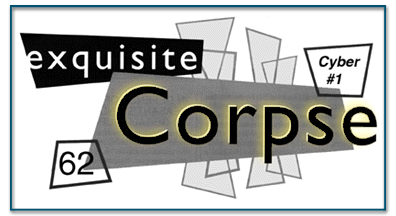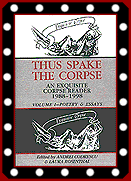Andrei Codrescu, Editor
Laura Rosenthal; Contributing Editor
Rex
Rose,
Daniel McNamara, Assistants to the Editor
Andrea Garland, Webmistress
Rex
Rose, Webmeister
INSIDE THE CORPSE
POEMS
Dick Gallup
APPLE
SKULLS
Gerald Burns
THE BOOK OF J AND THE GENESIS REVIVAL
Art Hilgart
MOCKING
BIRD
David Morse
RORSCHACHS FROM RAYBURN
Roland Rayburn
FOUR
PHOTOS
Chris Felver
THE
MIASMA, I
Stuart Stefany
A
MAN MISTAKING HIS EGO FOR HIS MOTHER
Mike Finn
A
CARTOON POEM
George Nobl
FIVE
POEMS
Dave Brinks
POEM
Gwendolyn Albert
LIMA
BEAN
Mark Spitzer
THE
MOON IN HIDING
Marione Ingram
NIETZSCHEAN ANARACHY & THE POST-MORTEM
CONDITION
Max Cafard
POEMS
Bill Berkson
DRINKING COCA-COLA ON RED ARMY STREET
Alex Sydorenko
SLEEPWALKING
Curzio Malaparte
THE
HOT AIR MACHINE
James Nolan
MEDIA AS CULTURE: THE STATE OF THE FIASCO
Jim Nisbet
WHY
WRITE ABOUT THE RROMA?
Roger Parham-Brown
SUFFER
THE LITTLE CHILDREN
Art Hilgart
EDISON'S
LAST BREATH
William Palmer
CUSTOMER CONTACT, A Reality Poem
John Schuerman

| CORPSE
READERS, TAKE HEART by Andrei Codrescu & Laura Rosenthal Andrei Codrescu moved Exquisite Corpse: A Journal of Books & Ideas to Louisiana in 1984 when he came to teach at LSU in Baton Rouge. Since its founding in January 1983 in Baltimore, the Corpse, as the aficionados intimately call it, has delighted not-so-innocent readers, catered to the craven complexes of overeducated esthetes, while also pleasing the autodidact lumpenproletariat on those long American afternoons by the Kerouakian railroad tracks now known as Starbucks and PJ's Coffee. In other words, we fed the souls of both the jaded and of those too young to drink. We also enraged the literary establishment, garnering resentment, jealousy, damnation, and three threats of never-materialised lawsuits. From the very first issue, the Corpse attracted an energetic and sophisticated cadre of writers united by a kind of suicidal fearlessness specific to eightiesâ America. In 1983, American literature had settled into a cozy bubble of MFA-program McWriters buttered with postgraduate NEA fellowships. American poetry was increasingly going back to the esthetics of the 1950s under the tutelage of impressionist critics like Helen Vendler of Harvard. Alongside prosaic confessional drivel in "free verse," throwback versification calling itself "the new formalism," captured the workshops and the university quarterlies. American fiction began returning to psychological realism and sentimental autobiography. The fury of the establishment at having its nap disturbed by experimental writers in the sixties and seventies (and by modernism, surrealism, and postmodernism before that) resulted in the return to a literary landscape H. L. Mencken had once called "the Sahara of the Bozarts." Taking potshots at this new status quo would have been like shooting fish in a barrel, but for the fact that the new reaction was (and is) Huge. This was just fine by the Corpse, which relishes a fight the way academics crave prizes. It turned out, however, that fighting was not what the Corpse turned out to be about. After the initial skirmishes with some of the more visible capos of the new retrenchment, it became evident that a community of terrific writers existed in pristine disdain of the mainstream, and their works made the Corpse an important literary magazine. These writers embraced a variety of esthetic and were part of different scenes: New York school and Black Mountain poets, West Coast surrealists and eco-surrealists, ethnic accentualists, Iowa actualists, midwestern abstractionists, Southern minimalists, and San Diego maximalists. The editor's eclectic pleasures were further enhanced by the absence of biographical notes. From the beginning, Exquisite Corpse was conceived as a newspaper, to be read for the news within, not for the glamorous bios of recent conquerors of the Amy Lowell Traveling Fellowship plus glam shot. We began on page one with debate and controversy and moved, like Don Quijote, from windmill to windmill. Each issue had its own story pieced together by its contributors exactly like a "cadavre exquis," the collaborative form that the French surrealists had enjoyed in the 1920s, from which Exquisite Corpse got its name. The Corpse, like Don Quijote, or perhaps Pantagruel, was also dedicated to the blurring of genres, demolishing distinctions between poetry and prose, lyric and reportage, essay and manifesto. In addition to poetry and a sprinkling of fiction (there was an inexplicable editorial bias against fiction), essays, letters, and art, the Corpse published "bureau" reports from various parts of the world, and a great many translations. |
Edited by Andrei Codrescu and Laura Rosenthal Click here to order this Paperback from Amazon.com THUS SPAKE THE CORPSE: AN EXQUISITE CORPSE READER, 1988-1998 is the long-awaited anthology from the pages of "Exquisite Corpse: a Journal of Books & Ideas," the decade's liveliest and most controversial literary magazine. Edited by Andrei Codrescu and Laura Rosenthal, published by Black Sparrow Press, this collection of over two hundred poets and essayists, represents some of the most brilliant and contentious literature of our time. Decried by some as "the New Yorker of the Avantgarde," and praised by others as "the light in the murk of current Am Lit," the Exquisite Corpse can now be savored in its spacious fullness. The second volume, containing translations, travel reports, and "lives of the poets," will be published by Black Sparrow in Spring 2000. |
| The
Corpse in Louisiana (1984-1998) had two distinct periods: the first
(1984-1990) was more or less an extension of the Baltimore Corpse,
tropicalized by the environs; the second (1990-1998) was the era of
the Body Bag. In its first Louisiana stage, the Corpse drew its energy
from early contributors to the magazine and material solicited by
the editor, with less than twenty percent of its contributions coming
over the transom. There was also a nameless and invigorating force
emanating from the diffuse hostility of the academic environment which,
in those days was (and weakly still is) a bastion of New Criticism
reincarnated as Southern-boy hickism.
In the second stage, with the addition of Laura Rosenthal's column Body Bag, which answered would-be contributors directly in the pages of the magazine, there was a sudden influx of young, new, hip voices into the Corpse. We were discovered by another generation of literary revolutionists who found in the tone of the magazine a perfect medium for their pop-culture-informed skepticism, violence, and humor. During this time, more than ten thousand literate, amused, hungry readers took the Corpse. The audience widened from just writers to readers interested in culture and, to some extent, the Corpse became a general culture magazine. Corpse essays were reprinted in Harper's, Utne Reader, Playboy, and other mass-circulation magazines, and Corpse poets started winning awards (!), such as Pushcart Prizes, and inclusion in anthologies like Best American Poetry. We didn't feel that such successes created any painful dilemmas, preferring to believe instead that "grownup" culture had finally tired of academic pieties and found the Corpse tonic and necessary. The initial critical attitudes of the Corpse became an inspiration for dozens of small magazines, zines, and newsletters. The world was catching up. At this time, more than seventy percent of our material came over the transom from writers unknown to us, but who had caught perfectly the Corpse je-ne-sais-quoi. Five years ago we changed the name of the publication to Exquisite Corpse: A Journal of Letters & Life, because we felt that it more accurately reflected our turn toward topics of wider interest. Academic hostility continued unabated, however, because the retros in charge of the pathetic literature pie resented having any part of their wobbly conformism questioned. The problem with the wimps, Jim Gustafson once said, is that there are so many of them. You said it, Jimbo. Every year they multiply to the point where they cover the sky like a locust plague, leaving room only for their own reproduction. No matter. We have our own sky. And it's a cybersky. In 1998, tired of mountains of paper, but also fearful of inevitable institutionalization, ossification, poetry fatigue, and literary ennui, we suspended publication of the paper Corpse, taking it into cyberspace. The Cybercorpse can be found at: http://www.corpse.org. The Cybercorpse is still the Corpse, but it is more fluid, subject to instant change and, above all, not so labor and time-intensive for us. And the trees are ecstatic. In 1998, City Lights Books published The Stiffest of the Corpse: An Exquisite Corpse Reader, 1983-1988. This anthology represented our first five years well, so that we did not feel the need to include here any material covered by that book. This gathering of the best contributions to Exquisite Corpse will be published in two volumes: the first will contain poetry, poetics, and essays; the second will contain fiction, "bureaus," translations, and essays on translation. Exquisite Corpse would not have been possible without the help of a number of bright and enthusiastic graduate assistants. The editors hereby profer a kiss-shaped lillyrose (a new flower) to: Matt Clark, Mark LaFlaur, Dave Racine, Kathy Crown, Lisa McFarren, Josh Russell, Dan Olson, Mark Yakich, and the indefatigable perfectionist Jean C. Lee. Particular thanks are in order to Mark Yakich, our current assistant, for working fiendishly on this anthology. |
|
